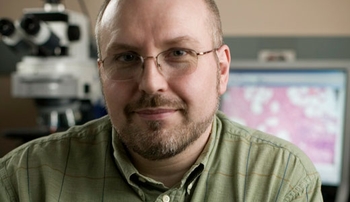Every three minutes a woman in the United States is diagnosed with breast cancer.
Of those women, approximately one in five test positive for Her2, an aggressive type of breast cancer that is harder to fight because it is less responsive to hormonal therapy.
 |
Kay-Uwe Wagner, Ph.D. |
An unexpected find
As Dr. Wagner and a former graduate student named Qian Zhang, Ph.D., tried to recreate the findings of a previous breast cancer study to determine therapeutic relevance, they discovered something completely unexpected.
“It was always thought that by inhibiting a certain protein, Cyclin D1, the growth of breast cancer cells could be stopped or at least slowed,” said Dr. Wagner, who is a professor in the UNMC Eppley Cancer Center.
Instead, he found the opposite to be true.
Another culprit
In collaboration with Hallgeir Rui, M.D., at the Kimmel Cancer Center in Philadelphia, Dr. Wagner’s team discovered that even though a significant subset of breast cancers produce Cyclin D1, the more deadly Her2-positive cases produce more of a similar protein called Cyclin D3.
“Both proteins are known for turning normal cells into cancer cells,” he said.
The new research suggests that only the combined inhibition of both proteins might be enough to stop the uncontrolled growth of Her2-positive breast cancer cells.
“The next step will be to test drugs that can do precisely that,” Dr. Wagner said.
Major journal publishes findings
Dr. Wagner’s findings were published in the December issue of Cancer Research — one of the most frequently cited cancer journals in the world.
The work subsequently was selected for inclusion in the Faculty of 1000, a library that features the top-ranked articles in biology and medicine.